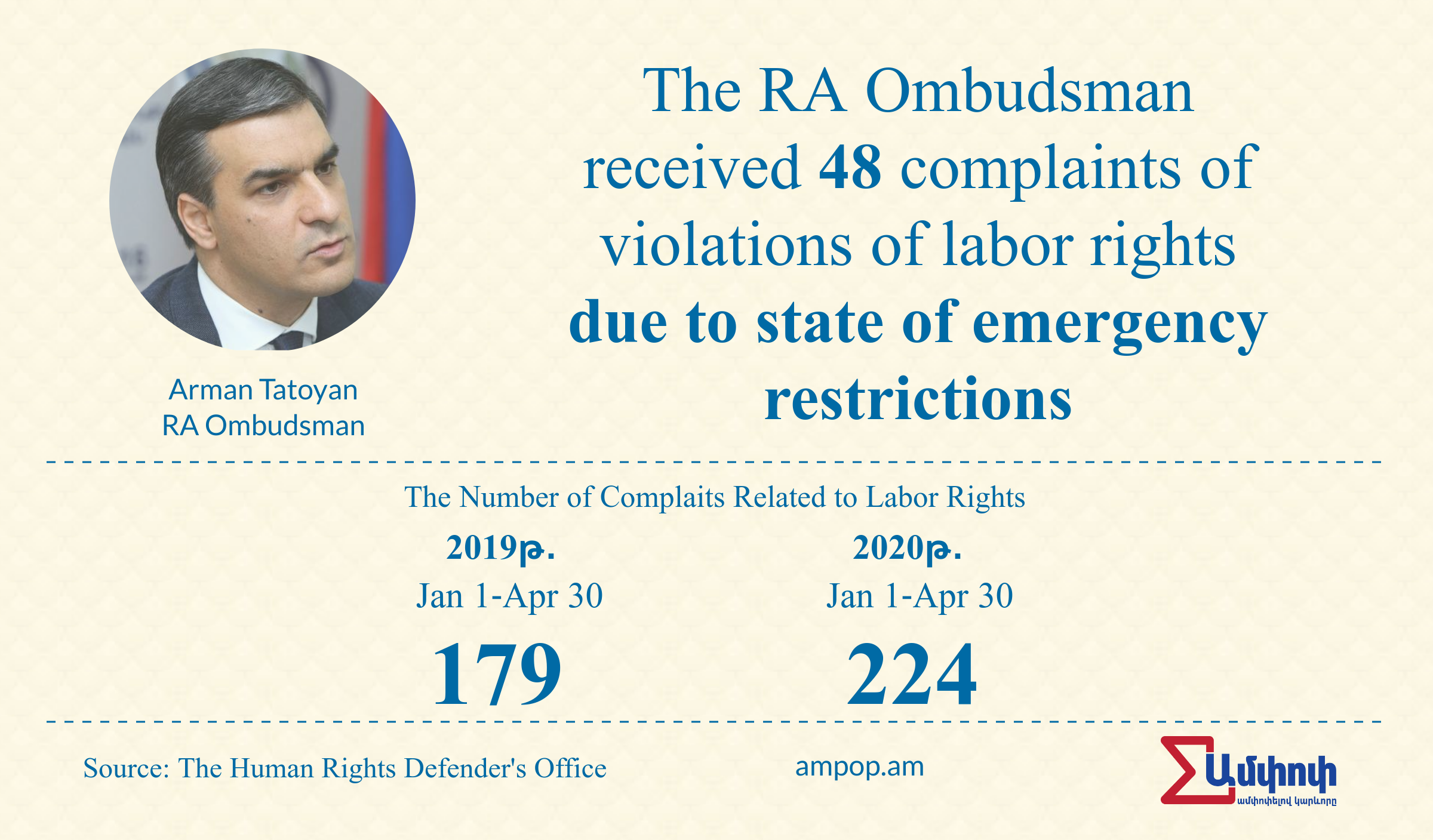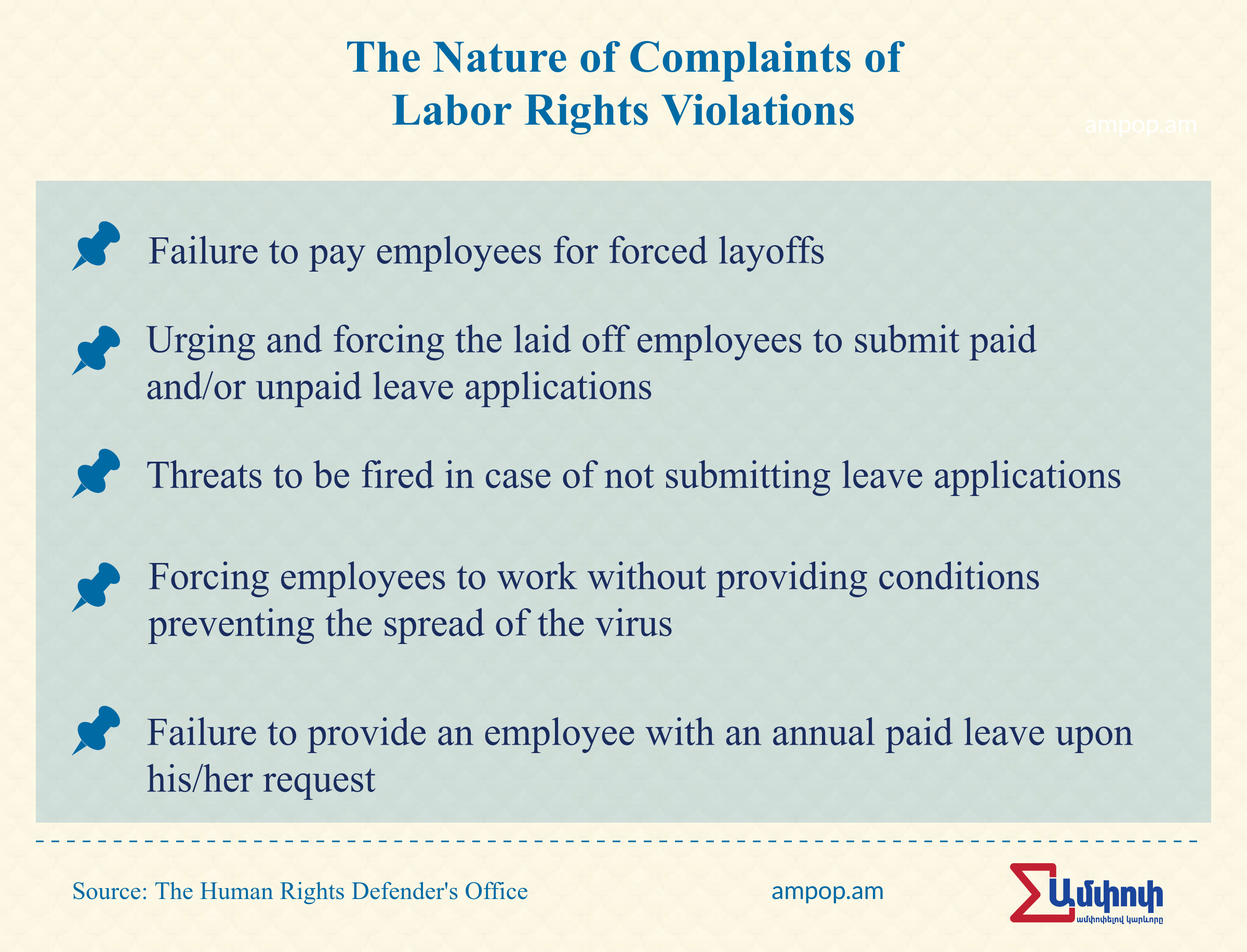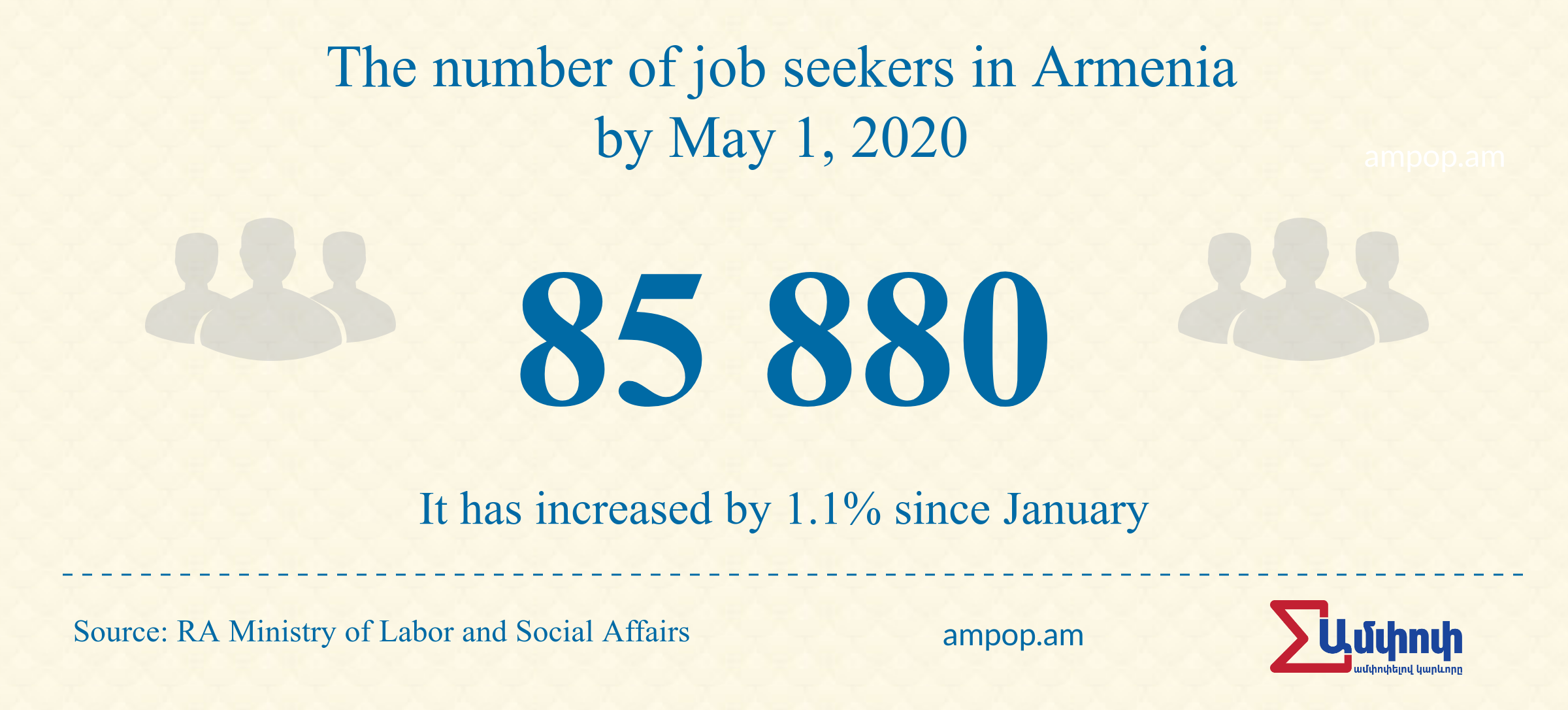The COVID-19 pandemic has become a kind of “litmus test” in the Armenian labor market. It not only raised the issue of unregistered employees, “hidden” salaries but also revealed the real value of an employee for an employer.
Job cuts conducted amid the coronavirus pandemic are only part of the violations of labor rights. And although the official figures are still “silent” which, according to experts, stems from the silence and ignorance of the employees, the socio-economic difficulties caused by the pandemic “broke” the silence and forced many of them to speak.
Situation
In the first months of the state of emergency, having job-related problems due to the pandemic, dozens of citizens were surprised to learn that they were not included in any list of the Government’s anti-crisis measures. However, the problem was not the lists but the employer-employee relations or their de jure absence.
“The Government’s anti-crisis measures were new, people expected to be informed, they wondered why they were not beneficiaries, why they could not be involved,” Tiruhi Nazaretyan, Chairwoman of the Tempus Center for the Protection of Social Rights, Labor Law Expert, said.
According to her, although labor rights have been more focused in recent years, the general awareness about the regulation of labor relations is at a very low level.
The employee in Armenia does not consider awareness of the rights as a criterion of welfare but facing the problems caused by the pandemic prompted the citizens that the pursuit of rights is a necessity.
“People realized that they were left defenseless. Many learned that they were not registered employees or grasped the consequences of it. Many people realized that instead of an employment contract, a service contract was signed,” Tiruhi Nazaretyan said, pointing out the posts she noticed on social networks and the publications in the press.
If during the whole year of 2019, the Human Rights Defender’s Office (Ombudsman’s Office) received 519 complaints about the violations of labor rights, during the first four months of 2020, the number of complaints has already exceeded 220. Moreover, this does not yet represent the complete picture.

When a dismissed citizen applies to a government agency to find out why he or she is not receiving assistance, the complaint is appeared into a statistical table of applications related to anti-crisis measures. Meanwhile, according to the representative of the Ombudsman’s Office, these applications obviously contain messages on the violation of labor rights.
“They are closely connected with the labor rights,” explains Tatevik Tokhyan, Head of the Department of Socio-Economic and Cultural Rights Protection of the Human Rights Defender’s Office (edt. – the interview had been conducted before Tokhyan’s position change).
According to her, the complaints about labor problems caused by the restrictions of the state of emergency were mainly directed against private sector employers.

Tokhyan considers it particularly unacceptable to send employees on unpaid leave, and such cases have occurred even in some state institutions.
“In fact, the person does not work, is not fired and cannot get any assistance because of it. For example, there is a polyclinic at Zvartnots Airport, which is designed to provide medical care to all staff. People were forced to leave there as well,” says Tokhyan.
According to the representative of the Ombudsman’s Office, the employees were not paid and, in fact, being employed were not involved in any of the social programs, even those with minor children. “In fact, in some cases, it would be preferable for the person to be fired, at least they would get financial assistance in that case,” she said.
Get informed but not to apply
Labor Law expert Tiruhi Nazaretyan has provided consultancy to many citizens who have had problems at workplace in recent months. She is not sure that many of them will put their knowledge into practice after learning about their rights.
First, the main reason is the lack of jobs․ Second, in some cases the current job is just a way to earn a living, not a springboard to climb the career ladder.

“People often face difficulties in finding a job or finding a job that suits their profession. They work, realizing that they are not in demand. Naturally, even if the employee is well aware of this s/he will not voice about his/her rights,” she says.
There are other reasons as well the main of which is the human factor․ “The complainant and struggling colleague may not be accepted by other members of the team. Even if you succeed in court, it is difficult to get back to work.”
According to Nazaretyan, Armenian legislation though ensures protection of labor rights but not sufficiently․ In our country, the main way to restore that right is still the court which is time consuming, costly and often unfruitful.
“Since the Labor Code does not protect the interests of the employee well enough, many do not believe that they have rights. They consult with lawyers and realizing the struggle they are to face, quit away the idea,” says Tiruhi Nazaretyan, considering the issue solution in the establishment of the Labor Mediator’s Office.
They are silent even when the rights of dozens of employees are violated
The issues of violation of labor rights in Armenia are not raised even when the rights of dozens of employees are violated.
“But if the problems are jointly voiced in front of the management team, this will become the problem of the whole institution and will not end, for example, with mass dismissals. The trade union will act as a negotiating party, a structure with greater rights (the legislation gives more rights to the collective than to the individual),” says Tiruhi Nazaretyan.
If the organization does not have a trade union, the employees can apply to the Confederation of Trade Union to raise the issue and get support both in the negotiation process and in finding legal solution to the problem.
Nazaretyan is sure that the trade unions, if they have a little more authority by law, would wonderfully assume the role of mediator, registering progress in the field of problem solving.
The labor law expert reminds that the problem is solved when it is addressed to the right addressee.
“In case of problems at the workplace, you should not apply to the Government, the Ministry of Labor and Social Affairs, the Human Rights Defender or any other person. You can apply to the Healthcare and Labor Inspectorate of the Republic of Armenia or a lawyer, as well as to a public human rights organization with that function, for consultancy. And most importantly, the complaint should be addressed first of all to the person in charge, for example, to the director of the factory.”
Law: clarifications in favor of the employee
As of July 1, 2021, the provision on state control over labor legislation enters into force, according to which the authorized inspection body of the sphere shall apply measures of liability in cases provided by law.
However, due to the increase in complaints because of the pandemic, on April 29, the legislature reserved the right to the Healthcare and Labor Inspectorate of the Republic of Armenia to monitor labor rights on the basis of written applications. The Labor Code was also amended to facilitate employer-employee legal relations in the context of the pandemic.
The Healthcare and Labor Inspectorate of the Republic of Armenia is carrying out intensified control these days. However, it is clear from the press reports that the violations registered by the Inspectorate mainly concern not wearing a mask and gloves, not carrying out thermometers and violating the established procedure of disinfection.
However, in order to strengthen the control of the Inspectorate over labor rights, a corresponding decision is expected to be made by the Prime Minister of the Republic of Armenia in June.
Text by Arusyak Kapukchyan
Infographics by Gayane Melikyan
More stories
- Chronic Diseases in Armenia and the Need for Health System Reforms
- Updating Charts: Covid-19 Situation in Armenia
#COVID19 #crisis
© The copyright of stories and visualizations on Ampop.am belongs to “Journalists for the Future” NGO. It is forbidden to use Ampop’s content and images without active hyperlinks to the source website. Uploading of infographics and images of Ampop.am is possible only in case of an agreement reached with JFF.
Փորձագետի կարծիք
First Published: 21/06/2020









